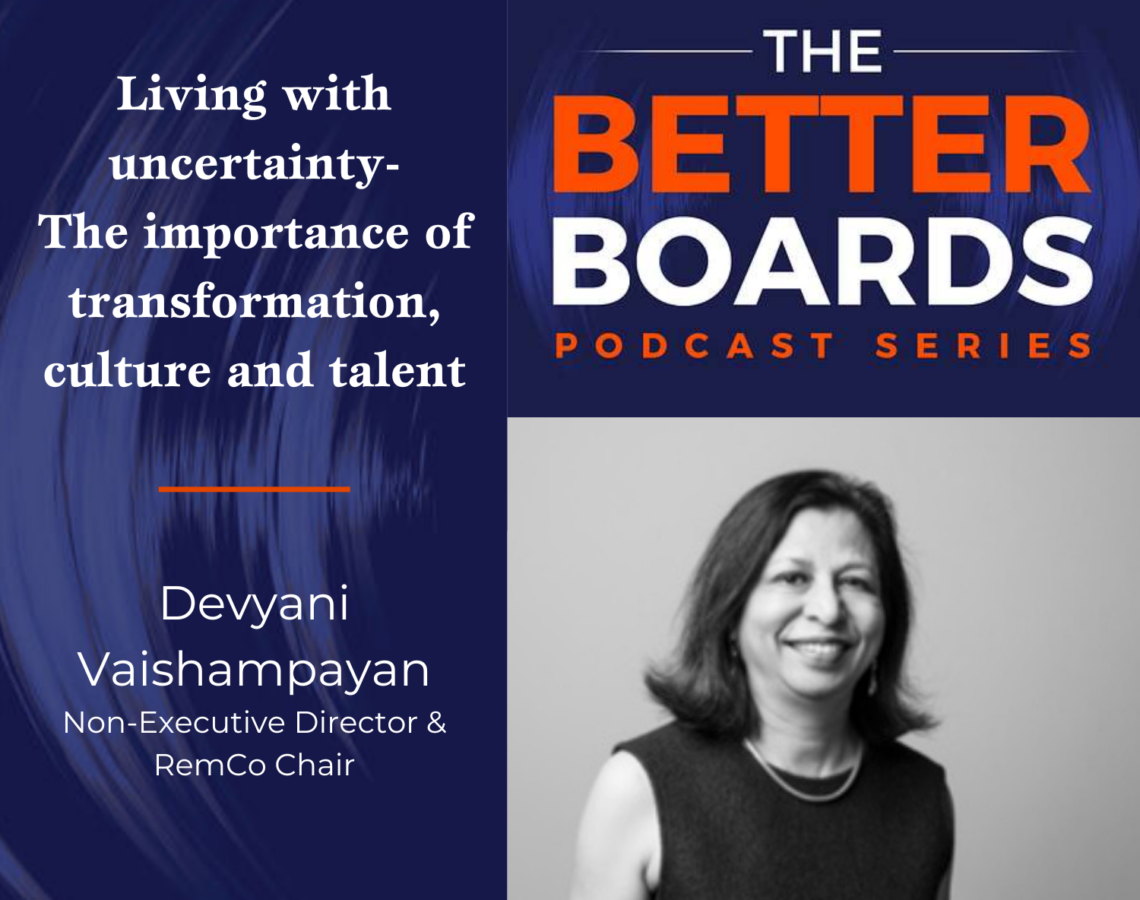Living with Uncertainty: The Importance of Transformation, Culture, and Talent

In recent years, transformation skills have gained significant importance at the board level, as highlighted by our board evaluations. Culture and talent have steadily climbed the board agenda—yet notably, HR professionals remain rare in boardrooms. Why?
In this episode of the Better Boards Podcast Series, Dr. Sabine Dembkowski, Founder and Managing Partner of Better Boards, explores the vital role of transformation, culture, and talent with Devyani P. Vaishampayan. Devyani is the Remco Chair and NED at Norman Broadbent Plc and Supply Chain Coordination Limited, and an Independent NED on the Audit Board of ForvisMazars. She is also a Fellow at Chapter Zero—an initiative focused on climate-conscious board leadership—and a Board Mentor with Critical Eye.
Over the past seven years, Devyani has emerged as a successful AI entrepreneur. She recently completed a strategic exit from her AI Innovation Hub, which supported organisations in adopting AI for leadership, culture, and future-of-work initiatives. Her journey is underpinned by over 30 years as a global, multi-sector FTSE 30 Group CHRO, where she led complex, multi-billion-dollar organisations.
“It’s still quite rare to find HR professionals on the board. There’s a perception that HR is a support function, lacking commercial acumen—and therefore not a strong partner at board level.”
Despite this, Devyani believes HR leaders can earn their place at the table by demonstrating commercial insight, a firm grasp of business drivers, financials, customer impact, and strategic thinking. She advocates that HR professionals consider roles beyond HR or entrepreneurial ventures to broaden their perspectives and build credibility.
“It’s a cliché now—every second person is talking about AI—but very few understand how swiftly change is occurring.”
Transformation is not new, but the pace of transformation today is unprecedented. Devyani points to recent geopolitical shifts, such as tariff changes, as examples of fast-moving developments requiring boards to act with agility. Within this context, AI emerges as both an accelerant and a disruptor.
Boards must recognise AI’s dual nature: its vast potential for insight and efficiency, and its inherent risks—such as bias, data privacy, and trust issues. Instead of imposing heavy restrictions that could stifle innovation and employee engagement, boards should invest the time to understand and prepare for AI’s full impact.
“When it comes to transforming culture and talent, boards need to lead more, engage more, and get hands-on with what’s happening on the ground.”
According to Devyani, boards that excel in managing culture and talent transformation do three things well:
- They bring in specialists. Recognising that not all leaders are well-versed in culture and talent transformation, high-performing boards engage experts who can help design the right systems and processes.
- They stay connected. One exemplary board Devyani works with holds dedicated two-day sessions to meet directly with employees. This face-to-face feedback surpasses what annual surveys offer and provides invaluable insights into workforce sentiment and leadership capability.
- They lead by example. Board chairs in particular can role-model values and lead cultural initiatives rather than leaving everything to the executive team.
“Boards today need to become mentors to the executive team.”
While some executives prefer a “nose in, hands out” approach, Devyani argues that most executive teams don’t have all the answers in today’s fast-paced world. A board that listens actively, provides context, and shares wisdom can become a trusted mentor and guide.
Skilled board chairs facilitate this by aligning the strengths of board members with executives, creating natural mentoring relationships. Subcommittees and cross-committee meetings can be structured to support ongoing conversations around leadership, strategy, and culture, without overburdening anyone.
The three top takeaways for effective boards from our conversation are:
- HR leaders have a unique board advantage. Like CFOs, they regularly engage with the board in their executive capacity. Use this access to understand board dynamics, shape leadership discussions, and position yourself as a trusted advisor.
- Go beyond your domain. Today’s board roles require more than deep expertise—you need breadth. Broaden your skills and perspectives to remain board-relevant and bring fresh value.
- AI will reshape everything.As a board member, you are responsible for going beyond webinars and getting hands-on with AI. Understand its capabilities and risks firsthand to guide your organisation wisely
Remember to subscribe and never miss an episode of the Better Boards Podcast Series. It’s available on Apple, Spotify, or Google.
To find out how you can participate in the Better Boards Podcast Series or for more information on Better Boards’ solutions, please email us at info@better-boards.com.



